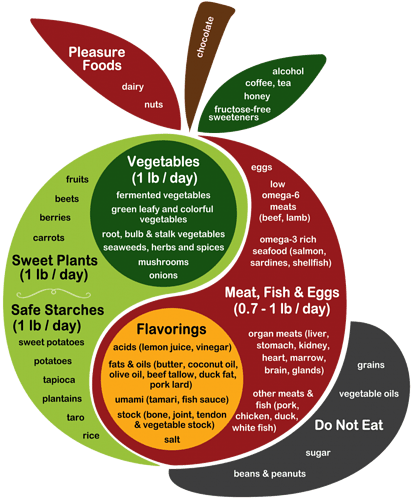I (a hardcore skeptic) am almost sold on it, this makes more sense to me than (and by far supercedes) anything I have ever read on the science of keto! I am not sifting any pasta with this which is extremely rare for me!
Any critiques?
A quote from their webpage that caught my interest (really has me floored when looking at the credentials and merit of Shou-Ching Shih Jaminet, Ph.D?).
”… Jan Kwasniewski developed his Optimal Diet something like 40 years ago and it has become extremely popular in Poland.
Kwasniewski recommended that adults should eat in the ratio
60 g protein – 180 g fat – 30 g carbohydrate (Source).
In terms of calories this is roughly 240 calories protein / 1640 calories fat / 120 calories carbohydrate on a 2000 calorie diet.
The Perfect Health Diet proportions are more like 300 calories protein / 1300 calories fat / 400 calories carbohydrate. So the diets would be similar if about 300 calories, or 15% of energy, were moved from fat to carbohydrate in the form of glucose/starch (not fructose/sugar!).
Note that we recommend obtaining at least 600 calories per day from protein and carbs combined. This ensures adequate protein for manufacture of glucose and ketones in the liver. But the Optimal Diet prescribes only 360 calories total (less in women), suggesting that gluconeogenesis cannot, over any long-term period, fully make up for the dietary glucose deficiency.
In the book, we note that a healthy body typically utilizes and needs about 600 glucose calories per day. On the Bellevue All-Meat Trial in 1928 Vilhjalmur Stefansson ate 550 protein calories per day, which is probably a good estimate for the minimum intake needed to prevent lean tissue loss on a zero-carb diet.
With only 360 carb plus protein calories per day, the Optimal Diet forces ketosis if lean tissue is to be preserved. Since at most 200 to 300 calories per day of the glucose requirement can be displaced by ketones, the Optimal Diet is living right on the margin of glucose deficiency. …” http://perfecthealthdiet.com/2010/11/dangers-of-zero-carb-diets-ii-mucus-deficiency-and-gastrointestinal-cancers/
http://perfecthealthdiet.com/about/


 ) because it makes for more compelling content to the desperate hordes who have failed on 10 diets before and have a finite amount of will power to brute force it through another fad up until early March.
) because it makes for more compelling content to the desperate hordes who have failed on 10 diets before and have a finite amount of will power to brute force it through another fad up until early March.